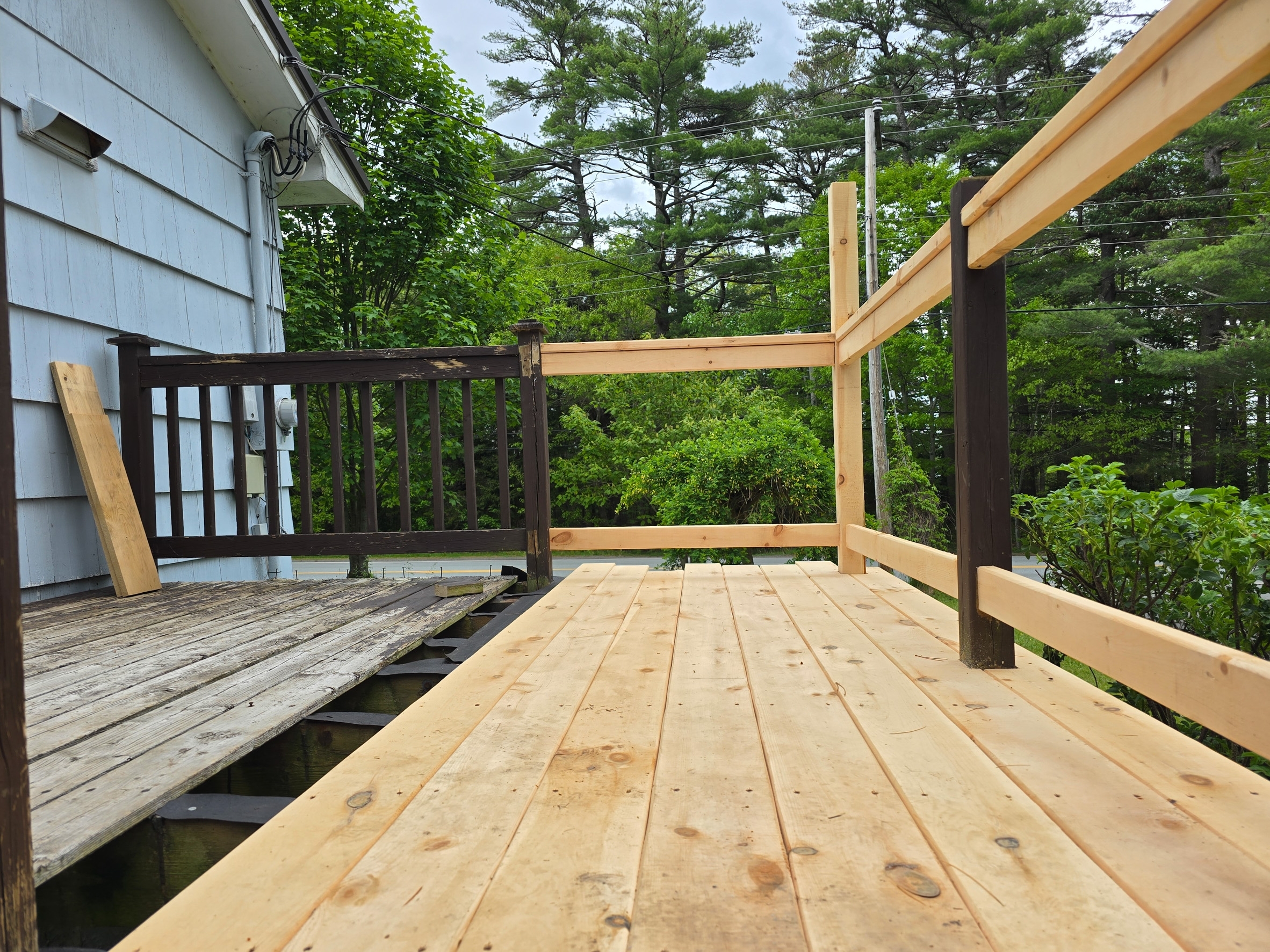Free Consultation
314-542-2222100+ years of combined experience and over $200 million won for our clients in Missouri and Illinois. Contact a personal injury lawyer near you.
Free Consultation
314-542-2222
In most cases, homeowners’ insurance does cover deck collapse, but only under certain conditions. Whether or not a policy pays out depends on the cause of the collapse, the terms of the policy, and the insurer’s findings after an investigation. If you or a loved one suffered an injury due to a deck collapse in St. Louis, MO, you may be entitled to financial compensation. At Burger Law, we help injured individuals navigate their legal rights and insurance challenges when disaster strikes at home or on someone else’s property.
Yes, however, it depends on the circumstances and legal duty of care. Deck, porch, or balcony collapses are serious structural failures that rarely occur without warning signs. While some cases are truly accidental, the majority stem from negligence by property owners, contractors, or third-party maintenance teams. When someone gets injured in a collapse, one of the first questions we ask is whether it could have been prevented. If the answer is yes, then blame often follows.
Common scenarios that indicate fault include ignored structural warnings, the use of poor-quality building materials, and a lack of proper inspection or maintenance. Sometimes the issue lies with overcrowding or misuse, especially during events where weight limits are exceeded. Property owners have a legal responsibility to ensure their structures are safe, especially when inviting guests or tenants. Builders and contractors, meanwhile, must comply with local building codes and industry safety standards.
From a legal perspective, proving fault means showing that a party owed a duty of care, breached that duty, and caused injury as a result. This process may involve engineering assessments, witness statements, and documentation of prior complaints or repair requests. When you work with a personal injury attorney, one of the first steps we take is determining whether the property owner or another responsible party could—and should—have done something to prevent the collapse.
According to the International Association of Certified Home Inspectors, deck failures are disturbingly common and largely preventable. Below are key findings from industry research:
These statistics highlight the hidden danger of decks that seem structurally sound but aren’t. One critical factor is the ledger board, which connects the deck to the house. It becomes the most vulnerable point of failure if it isn’t properly bolted and sealed. Most deck collapses result from this very issue, especially when combined with weathering, rot, or termite damage.
Other contributing causes include inadequate joist hangers, undersized footings, and loose railings or guardrails. Improper stair construction also presents a significant hazard, particularly when handrails are absent or don’t meet code. Homeowners often overlook these issues due to cost concerns or a lack of awareness.
As decks age, wear and tear become more likely. Even treated lumber eventually deteriorates, particularly if drainage and sealing are substandard. Regular inspection and timely repair are the only ways to ensure these high-traffic areas remain safe. In many personal injury cases, we find that simple maintenance could have prevented a catastrophic outcome. That’s why establishing the exact cause of a collapse is essential for pursuing a liability claim.
Deck safety depends on regular inspections. Experts recommend annual inspections of:
Qualified professionals should conduct inspections, especially for older structures or decks with known vulnerabilities. Homeowners often miss early warning signs like hairline cracks, minor tilting, or subtle soft spots in the decking surface. These red flags can indicate underlying damage that may worsen rapidly with time, weather exposure, or increased weight loads.
Professional inspectors use specialized tools and have a detailed understanding of local building codes. They can identify deficiencies that may not be visible to an untrained eye. The process typically involves a visual inspection, probing suspect areas, and checking the integrity of structural elements. Some inspectors also perform load testing or use moisture meters to detect hidden rot.
Documentation is key. Property owners should keep records of all inspections, maintenance, and repairs. This not only helps ensure the safety of the deck but can also serve as legal evidence in the event of a collapse. If someone is injured on your property, these records could be the difference between a denied claim and a valid defense. If you’re the injured party, an inspection report showing prior concerns can be the foundation of your case.
Liability can fall on property owners, builders, or contractors depending on their actions and knowledge of the risk. In Missouri, property owners are not automatically liable unless specific factors are present.
According to Missouri law in Section 537.348:
In personal injury cases involving deck collapse, we often see multiple layers of responsibility. If the deck was recently built or renovated, we investigate whether the contractor followed all relevant codes and standards. Even if the deck was permitted, that doesn’t mean it was constructed properly. Builders who cut corners can be held liable for injuries resulting from their work.
Homeowners or landlords may also be liable, especially if they were aware of structural issues. For instance, if tenants reported wobbly railings or spongy boards and the owner failed to act, that inaction can be grounds for legal fault. The same applies to property managers or HOAs who oversee shared living spaces. These entities have a duty to maintain safe common areas.
Your homeowners policy may or may not include structural coverage or personal injury liability. To improve protection:
Don’t wait for an accident to discover what’s missing in your policy.
Even if a policy appears to cover collapse, the fine print may include exclusions affecting your recovery. Many policies exclude losses caused by poor maintenance or gradual deterioration, and some may specifically limit payouts for structural failures due to earth movement, floods, or pests. As a homeowner, it’s essential to understand where your policy draws the line.
Injury claims related to deck collapse may be covered under liability provisions, but again, insurers may dispute causation or blame the injured person’s behavior. This is where legal counsel can provide value—by interpreting policy language and advocating on your behalf. If you rent or use your property for events, you may need additional insurance, such as a landlord or commercial rider.
Victims of a deck collapse may be entitled to compensation for:
In serious injury cases, damages may also include future medical expenses, loss of earning capacity, and long-term care. Courts may also award compensation for diminished quality of life or permanent disability. If negligence was particularly egregious, punitive damages may be considered to deter similar conduct in the future.
Each case is unique, and compensation depends on the severity of the injuries, the clarity of liability, and the financial losses incurred. Victims should document their injuries thoroughly and keep records of all related expenses. Photographs of the scene, medical reports, and witness statements can all strengthen a legal claim.
One of the challenges in pursuing compensation is the tendency of insurance companies to undervalue or outright reject claims. Adjusters may argue that the injury was pre-existing, unrelated to the collapse, or caused by the victim’s own actions. That’s why working with a legal team experienced in personal injury law is essential.
As a law firm, we’ve seen firsthand how devastating a deck collapse can be. It’s not just a structural failure—it’s a personal trauma. We represent victims who have been injured on residential and commercial properties, holding negligent parties and insurers accountable. Our mission is to help our clients rebuild physically, emotionally, and financially. You don’t have to go through it alone. Contact Burger Law today at (314) 500-HURT for a free consultation and take the first step toward justice.
Founder | Injury Attorney
Gary Burger has dedicated his career to standing up against bullies. The founder and principal attorney of Burger Law | St. Louis Personal Injury Lawyer has helped hundreds of Missouri and Illinois individuals and families recover th …
Years of experience: 30 years
Location: St. Louis, MO

Similar Blog Posts

Rear-end collisions are one of the most frequent types of car accidents in St. Louis and across the country, often resulting in property damage, personal injuries, and financial ha... read more.

Common Causes of Slip and Fall Accidents. Slip and fall accidents can occur in the workplace, at home, or in public for a variety of reasons. In 2019, over 8 millions people... read more.

If you have been seriously injured while visiting a property, you may have a premises liability claim. The Burger Law premises liability lawyers in St. Louis are committed to ... read more.

This page has been written, edited, and reviewed by a team of legal writers following our comprehensive editorial guidelines. This page was approved by Founding Partner, Gary Burger who has more than 30 years of legal experience as a practicing personal injury trial attorney. Gary’s robust legal knowledge is recognized by his peers as demonstrated by his industry awards and frequent Continuing Legal Education (CLE) lectures.
NO FEES UNTIL WE WIN YOUR CASE
We offer free consultations and are available 24/7 to take your call. Live chat, text, and virtual meetings are available.
or call us at